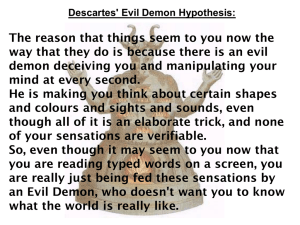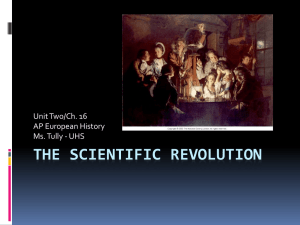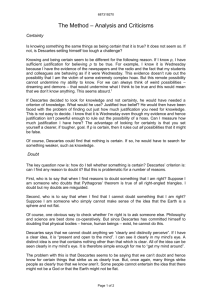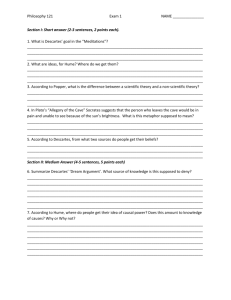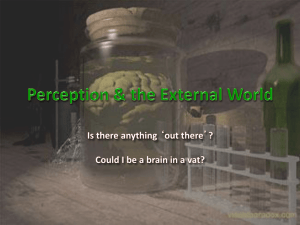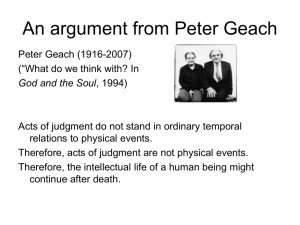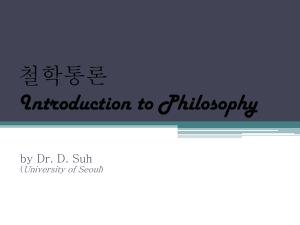The Evil Demon
advertisement
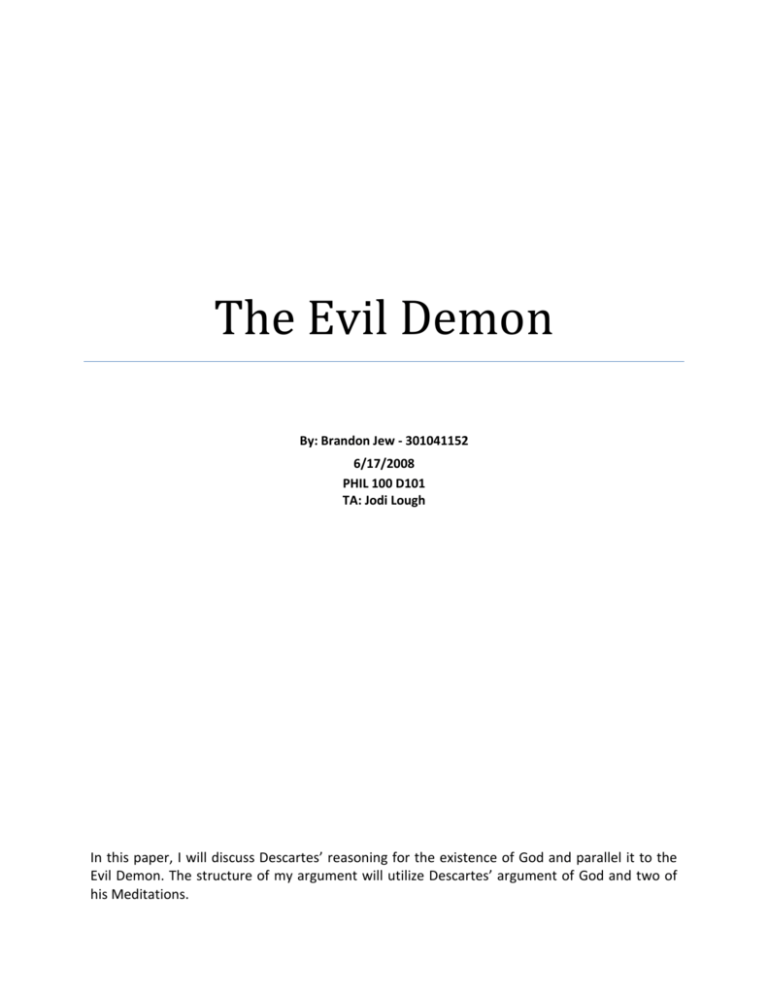
The Evil Demon By: Brandon Jew - 301041152 6/17/2008 PHIL 100 D101 TA: Jodi Lough In this paper, I will discuss Descartes’ reasoning for the existence of God and parallel it to the Evil Demon. The structure of my argument will utilize Descartes’ argument of God and two of his Meditations. In Descartes’ Meditation III, Descartes argues that his idea of God is a result of God existing. Although Descartes also has an idea of an Evil Demon, I believe that Descartes would not think that the Evil Demon exists. To prove why, one must first understand his source of ideas and reasoning for God’s existence. Descartes states that all ideas must originate from a source. He claims that there are three components to where ideas originate. He believes that an idea is a thought of a mental image that originated from being innate, acquired, or produced internally (Descartes p178 para.1). Innate ideas are what Descartes describes as “reality, truth, and thought (that) have come from (our) own nature” (Descartes p178 para.1). This means that there are ideas that are given to us the moment we are born. Ideas that seem to be present, willingly or not, are caused through our senses. Descartes uses the example of heat to describe that he is forced to feel this sensation. When he is sitting by a fire, he feels a sensation coming from the fire unwillingly (Descartes p178 para2). Ideas that are produced internally are made up from our own imagination or extracted from other ideas. With these three sources in mind, Descartes ponders where his concept of God originated in his mind. Descartes claims that God exists because he has an idea of God. This concept of God is someone who is omnipotent, omniscient, omnibenevolent, and omnipresent (Dr. Mc, wk 4). To begin his argument, Descartes introduces two forms of reality: formal and presentational. Formal reality is a scale based on perfection and how much material is being represented by the object. A blank piece of paper would have less formal reality than a book filled with pages of writing. Presentational reality is the degree of formal reality that it is made up of. Since God has unlimited powers and knowledge, God’s formal and presentational reality on this scale is 2 infinite. Descartes says that an object cannot create something that has more reality than the creator (Descartes p178 para.8). Using the previous example of a book, a blank piece of paper cannot create a book because it has less reality than a book. There is no plausible solution that a blank paper can represent more than what a book can symbolize. However, a book can create a piece of paper because it holds more reality. The structure of Descartes’ reasoning is believable with regards to the nature of how the world operates. A law in physics states that matter cannot be created nor destroyed. Using the same methodology, a piece of paper cannot add more reality to itself because it would have to create reality out of nothing. Descartes describes people as having a finite level of reality because of our imperfect knowledge (Descartes p181 para.2). Although Descartes has a finite degree of formal reality, he has an idea of God that has infinite presentational reality. Descartes believes that he could not have created this idea of God because he has less reality than God. God is the only one who is capable of creating the idea of God because God has infinite reality. Using the three sources of ideas, Descartes believes that he could not have derived it through his senses or acquired it because he would have known of its sudden appearance. He could not have made it up because he holds less reality than God. It follows that the idea of God was innate and concludes that God must have given it to him (Descartes p182 para.3). The same argument would not cause the Evil Demon to exist. The Evil Demon is an all powerful character that deceives. The Evil Demon has less reality than God but has more reality compared to people. Descartes first mentions the Evil Demon in his first medication about how there is a possibility that beliefs can be deceived by the Evil Demon. Since Descartes has this idea of an Evil Demon, does the argument for God fit the existence of the Evil Demon? Using 3 the same argument and the premises that the Evil Demon has more reality than Descartes and Descartes’ idea, it would seem to follow that he would believe in the Evil Demon. However, recall that Descartes suggests that there are three ways ideas can arrive in the mind. The Evil Demon could not have been made up by Descartes because the Evil Demon has more reality. There is a possibility that the idea could have been acquired or innate. Descartes says that one can acquire an idea through the senses, but also mentions an ability to produce ideas outside him (Descartes p178 para.4). While Descartes dreams, he states that he has “formed ideas… without the aid of external objects” (Descartes p178 para.4). I believe this is where the idea of the Evil Demon originated. Descartes conjured the idea of the Evil Demon when he was searching for foundational truths. It was then when he had an idea of an Evil Demon and developed the concept of a deceiving Evil Demon. Since one cannot create an idea with more reality, God or the Evil Demon could have put the idea in Descartes. Since God has more reality than the Evil Demon, it would follow that the Evil Demon exists because of God. I find this result to be improbable because of the characteristics of God. God would not create a deceiver because it would imply that God is imperfect. Since “deception arise(s) from defect” it would imply that God is imperfect (Descartes p182 para.1). This would conflict with the image of the perfection of God. Using Descartes’ claim that God is the “source of all truth”, God would not create an Evil Demon (Descartes, p176 para.5). Therefore, Descartes would not believe that an Evil Demon exists. Although Descartes argues that having an idea of God concludes that God exists, the same philosophy does not work for the Evil Demon. Descartes would not think that the Evil Demon existed by having an idea of an Evil demon. 4
